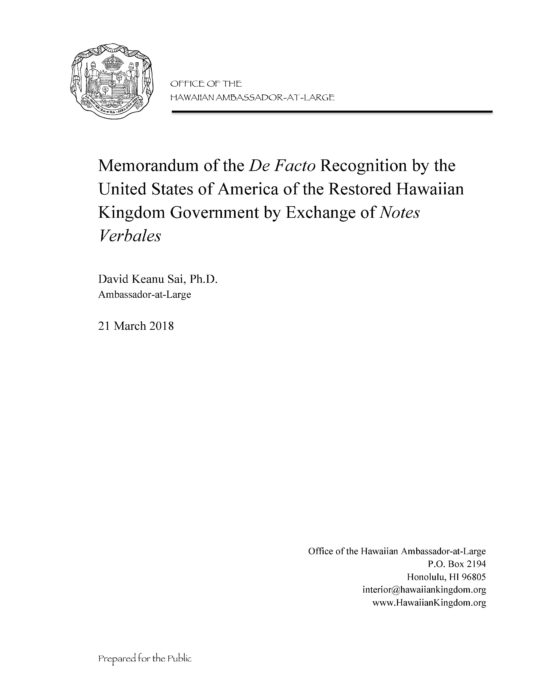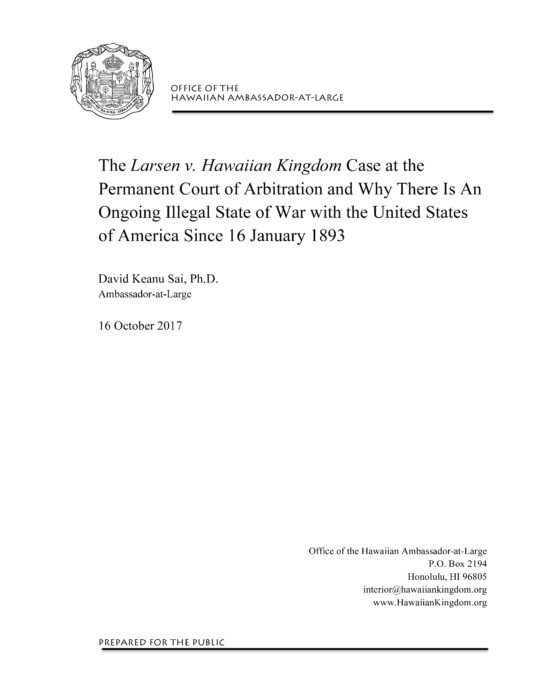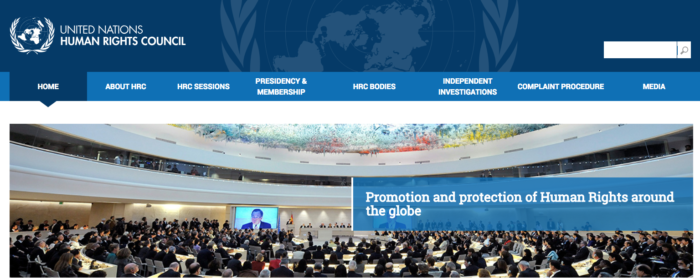
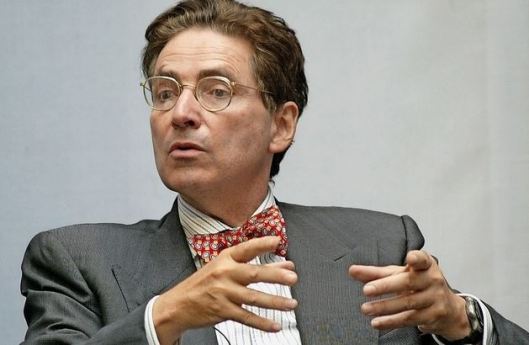 On May 10, 2018, Mrs. Routh Bolomet, a Hawaiian-Swiss citizen, provided Dr. Keanu Sai with a remarkable document that came out of the United Nations Office of the High Commissioner for Human Rights in Geneva, Switzerland, regarding Hawai‘i. Mrs. Bolomet told Dr. Sai that it was her hope that the document authored by Dr. Alfred M. deZayas, would help in bringing the American occupation to an end. Dr. Sai said, “To call this document ‘remarkable’ is an understatement.”
On May 10, 2018, Mrs. Routh Bolomet, a Hawaiian-Swiss citizen, provided Dr. Keanu Sai with a remarkable document that came out of the United Nations Office of the High Commissioner for Human Rights in Geneva, Switzerland, regarding Hawai‘i. Mrs. Bolomet told Dr. Sai that it was her hope that the document authored by Dr. Alfred M. deZayas, would help in bringing the American occupation to an end. Dr. Sai said, “To call this document ‘remarkable’ is an understatement.”
In 2006, the United Nations Human Rights Council was formed as an intergovernmental organization within the United Nations system. The Council replaced the United Nations Commission on Human Rights that was established in 1946. The Council is comprised of 47 member States of the United Nations that serve for a three year term.
On September 29, 2011, the Council passed resolution 18/6 in order to establish an Independent Expert for the promotion of a democratic and equitable international order. The Council decided to establish a new Independent Expert, with the authority to identify possible obstacles to the promotion and protection of a democratic and equitable international order, to identify best practices and to work in cooperation with States in order to foster the adoption of measures at the local, national, regional and international levels.
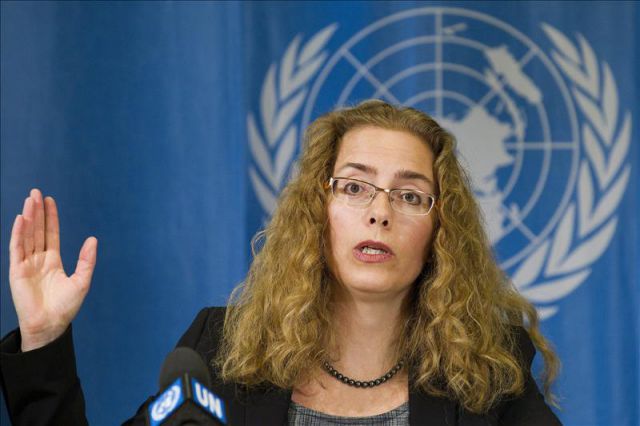 The President of the Council, Ambassador Laura Dupuy Lasserre of Uruguay, nominated Dr. deZayas and on March 23, 2012 he was elected by the Council as the first Independent Expert on the promotion of a democratic and equitable international order by the United Nations Human Rights Council. The United States served as a member State of the Council when Dr. deZayas was elected.
The President of the Council, Ambassador Laura Dupuy Lasserre of Uruguay, nominated Dr. deZayas and on March 23, 2012 he was elected by the Council as the first Independent Expert on the promotion of a democratic and equitable international order by the United Nations Human Rights Council. The United States served as a member State of the Council when Dr. deZayas was elected.
The Council requested the newly elected Independent Expert to present its first report to the Council at its twenty-first session in 2012. An interim report was submitted in 2012 that was followed by a full report in 2013. Yearly reports have been submitted ever since.
An Independent Expert, also known as a Special Rapporteur, is a person who examines and reports on a specific human rights issue or theme. The Independent Expert reports to both the United Nations Human Rights Council and the United Nations General Assembly. Dr. deZayas completed two three-year terms where his mandate was completed on April 30, 2018.
Of the fifteen topics of responsibility for the Independent Expert that come under its mandate, two topics resonate regarding Hawai‘i’s situation of a prolonged and illegal occupation.
- The right of peoples and nations to permanent sovereignty over their natural wealth and resources; and
- The right of all peoples to peace.
In order to achieve the realization of these subjects, the Independent Expert, among other tasks, will:
- Identify possible obstacles to the promotion and protection of a democratic and equitable order, and to submit proposals and/or recommendations to the Human Rights Council on possible actions in that regard;
- To raise awareness concerning the importance of promoting and protecting of a democratic and equitable international order; and
- To work in cooperation with States in order to foster the adoption of measures at the local, national, regional and international levels aimed at the promotion and protection of a democratic and equitable international order.
Of particular note in his 2012 initial Report to the Council, Dr. deZayas stated:
“The Independent Expert will build on the studies already conducted by the Commission on Human Rights, the Subcommission on the Promotion and Protection of Human Rights, the Human Rights Council and its Advisory Committee, as well as on the work of the family of special rapporteurs, General Assembly and Commission on Human Rights resolutions on the right of peoples to peace (Assembly resolution 39/11, Commission resolution 2002/71).”
The Commission on Human Rights resolution 2002/71, adopted on April 25, 2002, regarding “the right of peoples to peace” affirmed “the obligation of all States to refrain in their international relations from the threat or use of force against the against the territorial integrity or political independence of any State, or in any other manner inconsistent with the purposes of the United Nations.” It is apparent that this reference would directly apply to the United States violation of the Hawaiian Kingdom’s territorial integrity and its political independence, which brought about an illegal state of war.
In his 2013 Report to the United Nations General Assembly, Dr. deZayas was unaware of Hawai‘i’s true legal status as an independent and sovereign State that has been under an illegal and prolonged occupation. He assumed that Hawai‘i was a part of the United States and that the native population (aboriginal Hawaiians) had the status of indigenous peoples with a right to self-determination.
This misrepresentation is understandable given the fact that the United States and the State of Hawai‘i actively promoted this false narrative, and some aboriginal Hawaiians even attend sessions of the United Nations Permanent Forum on Indigenous Issues in New York, in addition to participating in United Nations Human Rights bodies, in Geneva, promoting aboriginal Hawaiians as a colonized people and not as nationals of an occupied State.
Under the heading “Lack of democratic participation by indigenous and unrepresented peoples” in the 2013 Report, Dr. deZayas notes aboriginal Hawaiians as an indigenous people. A reference is made in the Report to Concluding Observations of the Human Rights Committee on the Second and Third U.S. Reports to the Committee (2006) in footnote 55 under the heading of “indigenous and unrepresented people.” The Committee was comprised of 18 experts that assumed Hawai‘i to be a part of the United States. The Committee is not to be confused with the United Nations Human Rights Council, which is comprised of 47 member States (nation-states) and not individual experts. The Committee noted it:
“regrets that it has not received sufficient information on the consequences on the situation of Indigenous Native Hawaiians of Public Law 103-150 apologizing to the Native Hawaiian Peoples for the illegal overthrow of the Kingdom of Hawaii, which resulted in the suppression of the inherent sovereignty of the Hawaiian people.”
The underlying problem taken here by the Committee of experts is their failure to distinguish between the government and the nation-state (State). It was admitted by the United States that the overthrow was illegal, but it was an illegal overthrow of the government and not the nation-state. Despite the illegal overthrow of the government, the Hawaiian Kingdom, as a nation-state, would continue to exist under a prolonged occupation by the United States. This is similar to the American overthrow of the Iraqi government in 2003, but Iraq, as a nation-state, continued to exist under a military occupation until it ended in 2009. Iraqi nationals during the period of occupation were not a colonial territory of the United States.
In addition, the nation-state is called the “Hawaiian Kingdom,” not the “Kingdom of Hawai‘i.” The term “Kingdom of Hawai‘i” was used in the United States 1993 Apology Resolution, Public Law 103-150. It is an American term.
In the 1893 Protest by Queen Lili‘uokalani she stated, “I, Liliuokalani, by the grace of God and under the constitution of the Hawaiian Kingdom, Queen, do hereby solemnly protest against any and all acts done against myself and the constitutional Government of the Hawaiian Kingdom.” She did not identify the country as the “Kingdom of Hawai‘i.”
Based on this misinformation of Hawai‘i’s legal status, Dr. deZayas provided the following recommendation in paragraph 69(n) of the 2013 Report.
“The General Assembly may consider revisiting the reality of self-determination in today’s world and refer to the Special Committee on Decolonization and/or other United Nations instances communications by indigenous and unrepresented peoples wherever they reside, inter alia, in Alaska, Australia, Canada, Chile, China, the Dakotas, French Polynesia, Hawaii, Kashmir, the Middle East, the Moluccas, New Caledonia, Northern Africa, Sri Lanka and West Papua, with reference to Chapter XI of the Charter of the United Nations. The General Assembly may also consider amending its rules and procedures to allow for the participation of indigenous and non-represented peoples. Meanwhile, the Assembly should urge States to implement the Declaration on the Rights of Indigenous Peoples. It should ensure that indigenous, non-represented peoples, marginalized and disempowered peoples, and peoples under occupation have a genuine opportunity to participate in decision-making processes.”
Five years later, Dr. deZayas, did a complete reversal on his understanding of Hawai‘i’s legal status from a colonized people with a right to self-determination to a nation-state, called the Hawaiian Kingdom, that has been under a military occupation by the United States since 1893.
On February 25, 2018, Dr. deZayas authored a memorandum titled “Re: The case of Mme Routh Bolomet” in response to a complaint submitted to the Council by Mrs. Bolomet in 2017. Without getting into the particulars of Mrs. Bolomet’s complaint, the Independent Expert addressed the broader issue of the military occupation of the Hawaiian Kingdom and the requirement of the United States, as the occupying State, to administer the laws of the occupied State, being the Hawaiian Kingdom. He stated,
“I have come to understand that the lawful political status of the Hawaiian Islands is that of a sovereign nation-state in continuity; but a nation-state that is under a strange form of occupation by the United States resulting from an illegal military occupation and a fraudulent annexation. As such, international laws (the Hague and Geneva Conventions) require that governance and legal matters within the occupied territory of the Hawaiian Islands must be administered by the application of the laws of the occupied state (in this case the Hawaiian Kingdom), not the domestic laws of the occupier (the United States).
Here follows Dr. deZayas’ Memorandum in its entirety, which can be downloaded in PDF format.
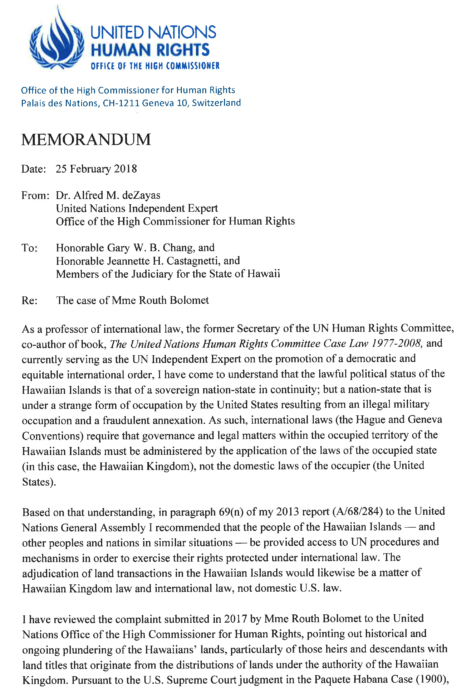
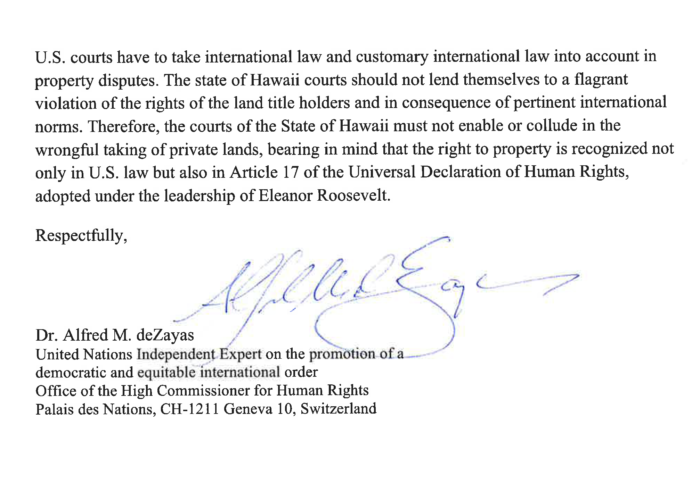 His memorandum also serves as an amendment to the 2013 Report correcting the legal status of Hawai‘i as an occupied State and not an issue of self-determination for an indigenous group of people. In line with this change, Article 69(e) of his recommendations is more appropriate, “States should ratify the individual complaints procedures of the United Nations human rights treaties, adhere to and utilize the inter-State complaints procedures, and globalize the reach of the International Criminal Court.”
His memorandum also serves as an amendment to the 2013 Report correcting the legal status of Hawai‘i as an occupied State and not an issue of self-determination for an indigenous group of people. In line with this change, Article 69(e) of his recommendations is more appropriate, “States should ratify the individual complaints procedures of the United Nations human rights treaties, adhere to and utilize the inter-State complaints procedures, and globalize the reach of the International Criminal Court.”
Dr. deZayas’ Memorandum was sent by the Swiss Postal service, La Poste, in Geneva, to the United States President, the Secretary of State, the State of Hawai‘i Attorney General, a State of Hawai‘i Judge Gary W.B. Chang of the Land Court, and State of Hawai‘i Judge Jeanette H. Castagnette of the First Circuit. Mrs. Bolomet is a defendant in a case before both Judge Chang and Judge Castagnetti.

